Our team has recently published two studies on the benefits of grooming exchange in Barbary macaques. Grooming is intensely studied by primatologists as a model behaviour to analyse the benefits of sociality.
In our first study (Molesti & Majolo 2015) we found that grooming did not increase food tolerance soon after a grooming interaction ended. This is not a surprising result, as the social benefits of grooming are more likely to become evident when considering large time windows than over short-term exchanges.
In our second study in male macaques (Young et al 2014), we found that monkeys with strong social bonds (measured by grooming exchange and other friendly behaviours) were better able to cope with social (aggression received) and environmental (low temperature) stressors. This supports previous research on humans and other animals in showing that sociality gives benefits in terms of survival, reproduction and response to stress.
Molesti S & Majolo B. (2015). No short‐term contingency between grooming and food tolerance in Barbary macaques (Macaca sylvanus). Ethology, 121: 372-382.
Young C, Majolo B, Heistermann M, Schülke O, & Ostner J (2014). Responses to social and environmental stress are attenuated by strong male bonds in wild macaques. Proceedings of the National Academy of Sciences, 111: 18195-18200.


Comments are closed.